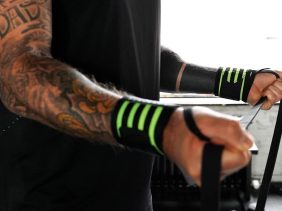Testosterone Dropping? A Guide to Upping Your T
 ©Eugenio-Marongiu
©Eugenio-Marongiu
You hear it from middle aged guys a lot: “I don’t feel as good as I did in my twenties.”
This is code for “I don’t feel like my testosterone tank is topped off like it was before”—and it’s not all in their heads. Here’s the low-down on low-T.
What is testosterone?
Testosterone is the major sex hormone in males, and contributes to several processes throughout the body, including penis and testes development in early life, the development of facial and pubic hair, sex drive, sperm production, bone strength, and muscle size and growth. Plus, females have testosterone, too, and it plays a role in the function of ovaries as well as bone health.
Among men, testosterone peaks in the late teens to early twenties, as seen on the chart below, published in the journal PloS One. After that early life apex, testosterone drops about 1% to 2% annually. By age 45, about a third of men may have testosterone levels considered lower than normal; however, what should be considered abnormal is a source of controversy in the scientific community.
How to know if you are low T?
The only way to know is by visiting a physician, who can run a blood test and determine if you have male hypogonadism. Some symptoms that might send you to the doctor include decreased libido, erectile dysfunction, depression or other mood differences, tiredness, loss of muscular strength, and feeling cloudy when it comes to memory or concentration. It may take multiple blood tests, since testosterone fluctuates during the day. A normal range is considered 300 to 1000 ng/dl, and the average is about 600.
“In the right person, testosterone can help a lot,” Alex Pastuszak, M.D. a urologist and assistant professor at the University of Utah, told the UT podcast “Who Cares About Men’s Health?” If you and your doctor decide treatment is the way forward, there are a few options, including a T supplement which can come as an injection, cream, or pill; and drugs called human chorionic gonadotropin (hCG) or clomid, both of which stimulate testosterone production.
Take a look at that list of symptoms again and play amateur doctor. If it’s not low T, what could it be? It could be a lackluster diet, and an exercise regime that’s fallen off. And it’s also worth noting that T supplements can be used for a short amount of time to break a patient out of lethargy, and then when they’re back to being active and energized, then take them off of the supplement, Pastuszak explained.
Both cases suggest an alternative to supplementation for certain people: lifestyle changes. There are many things you can do in your day-to-day to improve your testosterone profile—and feel better overall along the way.
Eat plenty of healthy fats
Several studies have found a positive relationship between healthy fats and testosterone production. For starters, men who are on low-fat diets have significantly lower testosterone compared with men on high-fat diets, found researchers in the UK. More specifically, omega-3 polyunsaturated fatty acids are good for T, while trans fatty acids harm hormone levels, according to a study in the Asian Journal of Andrology. Fill your diet with cold water fish (salmon, sardines, mackerel), seeds and nuts (walnuts, cashews, chia, flaxseed), olive oil, and certain fortified foods like eggs and yogurt, just to name a few. To avoid trans fatty acids, limit the amount of fried or highly processed foods in your diet.
Work on improving your body composition
It seems that having more body fat can cause testosterone levels to take a hit. In a study from South Korea, researchers found that “body and visceral fat masses showed marginally significant negative correlations with serum total testosterone levels”— essentially, that having these two types of fat were correlated with lower levels of T. And because low T is also associated with erectile dysfunction, it may be that getting more exercise and lowering body fat could help men have better energy. Focus on aerobic exercises, which helps cardiorespiratory fitness and reduces fat. Take up a cardio program, like running, cycling, or rowing. And HIIT training may be particularly good for improving your testosterone profile, suggests research in Endocrine Connections. Better yet—vary things up. It’ll help reduce your chance of injury, and keep things interesting.
And of course weight training will help overall health, too. Typically, people with greater muscle mass have an improved metabolism, so lifting should remain part of your testosterone-minded exercise plan.
Eat plenty of produce
Upping the amount of antioxidant and fibre filled leafy greens, vegetables, and fruit are great for helping achieve a better body composition. A special shout-out goes to onion (a review of research suggests that its healthy effects may also be good for your hormone profile), as well as garlic, which an animal study proposes may help increase serum testosterone.
Related: 7 reasons you should add more fibre to your diet
Get quality sleep
Sleep and testosterone have an interesting back-and-forth relationship. People with low testosterone may get enough sleep, but it might not be quality; people who have lower testosterone and who carry more body weight may have sleep disorders such as sleep apnea, according to a paper from the University of Adelaide in Australia. So how do you get to sleep if you’re a little low on T, or just not feeling so hot, and it’s affecting your ability to get shuteye? First, if you or a partner expects you have a disorder such as sleep apnea due to things like snoring or because you stop breathing during the night, see a sleep specialist; if you’re not getting quality sleep, it’s going to impact every other part of your life. If you get tired during the day, or need to chug caffeine to power through, it might be time to create better sleep hygiene habits. That means no TV or technology too close to bedtime, keeping coffee to the early morning only, finishing dinner early and cutting off drinking alcohol earlier in the day, setting your bedroom temperature in the 60s, and taking a hot shower before crawling into bed.
Related: How to sleep well: 8 tips for a good night’s sleep
Avoid over-the-counter testosterone supplements — or black market T
You’ve probably been bombarded with ads for pills that say they’ll “boost T,” “improve libido,” “feel stronger,” and the like—but do they really work? According to The World Journal of Men’s Health, the answer is most likely no. Just a quarter of the 50 formulas that researchers tested had science to back their claims, and 10% of the samples even had ingredients that might have a negative effect on T. And it goes without saying that you should only take testosterone supplements that are prescribed by a qualified, trusted doctor, most likely a urologist. Taking T involves a lot of surveillance, because too much testosterone taken for too long can have long-lasting health effects.
More healthy living tips from foodspring:
- More performance in the gym through mobility training
- The #1 Reason Your Muscles Aren’t Growing
- 6 Surprising Effects Lifting Weights, According to Science
- Push & Pull – The Only 6 Moves Your Need to Know to Build Strength
Sources for this article
We at foodspring use only high-quality sources, including peer-reviewed studies, to support the facts within our articles. Read our editorial policy to learn more about how we fact-check and keep our content accurate, reliable, and trustworthy.

































